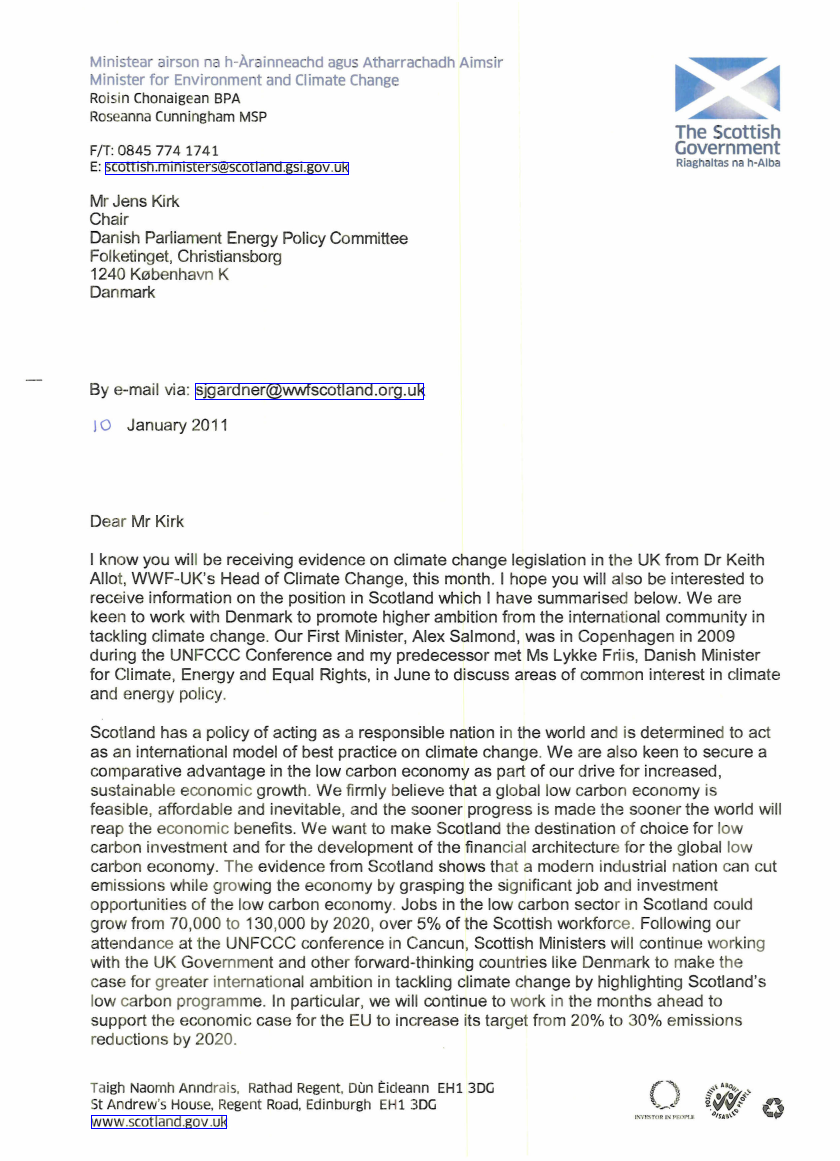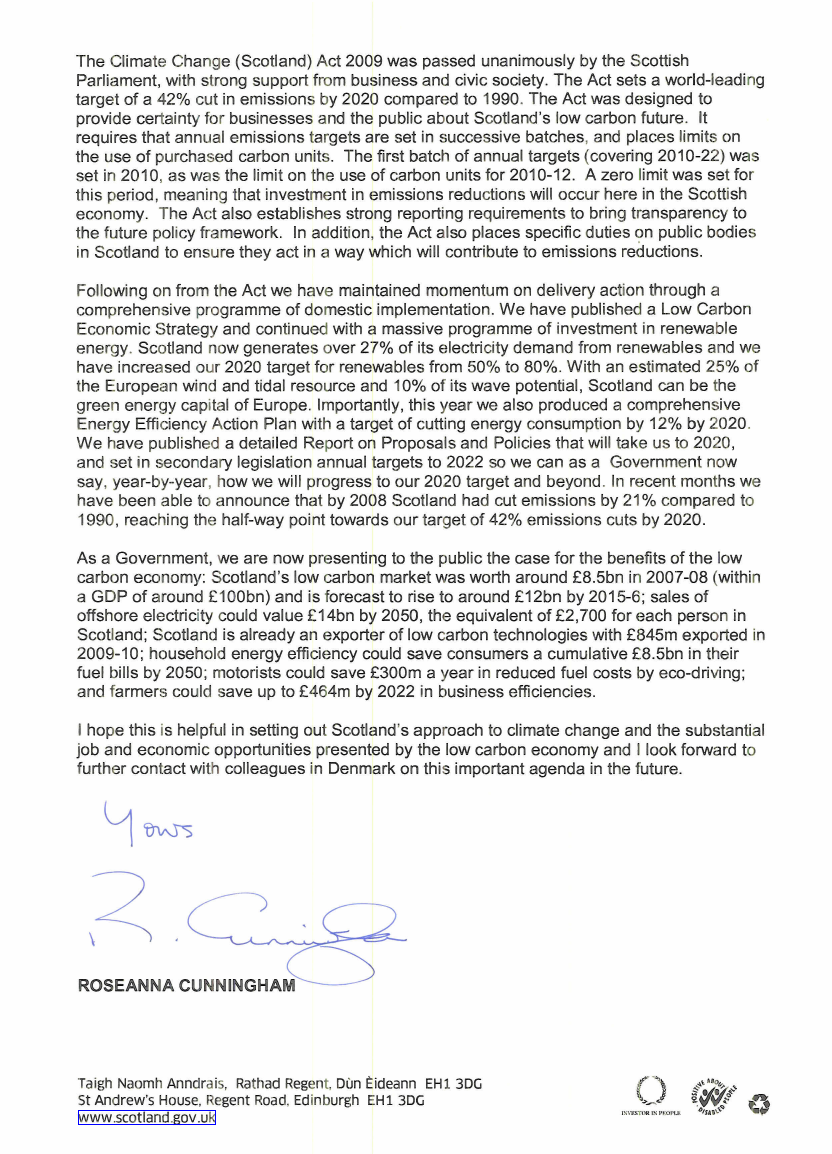Det Energipolitiske Udvalg 2010-11 (1. samling)
EPU Alm.del Bilag 127
Offentligt
Ministear airson na h-Arainneachdagus AtharrachadhMinister for Environmentand Climate ChangeRoisin Chonaigean BPARoseanna Cunningham MSP
Aimsir
~
L
-..na h-Alba
The ScottishGovernmentRiaghaltas
Mr Jens KirkChairDanish Parliament Energy Policy CommitteeFolketinget, Christiansborg1240 K0benhavn KDanmark
January 2011
Dear Mr KirkI know you will be receiving evidence on climate change legislation in the UK from Dr KeithAllot, WWF-UK's Head of Climate Change, this month. I hope you will also be interested toreceive information on the position in Scotland which I have summarised below. We arekeen to work with Denmark to promote higher ambition from the international community intackling climate change. Our First Minister, Alex Salmond, was in Copenhagen in 2009during the UNFCCC Conference and my predecessor met Ms Lykke Friis, Danish Ministerfor Climate, Energy and Equal Rights, in June to discuss areas of common interest in climateand energy policy.Scotland has a policy of acting as a responsible nation in the world and is determined to actas an international model of best practice on climate change. We are also keen to secure acomparative advantage in the low carbon economy as part of our drive for increased,sustainable economic growth. We firmly believe that a global low carbon economy isfeasible, affordable and inevitable, and the sooner progress is made the sooner the world willreap the economic benefits. We want to make Scotland the destination of choice for lowcarbon investment and for the development of the financial architecture for the global lowcarbon economy. The evidence from Scotland shows that a modern industrial nation can cutemissions while growing the economy by grasping the significant job and investmentopportunities of the low carbon economy. Jobs in the low carbon sector in Scotland couldgrow from 70,000 to 130,000 by 2020, over 5% of the Scottish workforce. Following ourattendance at the UNFCCC conference in Cancun, Scottish Ministers will continue workingwith the UK Government and other forward-thinking countries like Denmark to make thecase for greater international ambition in tackling climate change by highlighting Scotland'slow carbon programme. In particular, we will continue to work in the months ahead tosupport the economic case for the EU to increase its target from 20% to 30% emissionsreductions by 2020.Taigh Naomh Anndrais. Rathad Regent, Dun Eideann EH1 3DGSt Andrew's House. Regent Road. Edinburgh EH1 3DGwww.scotland.gov.uk~-TOR
{!,,~,I'l:YF_'1'0;
-"
1'1-:01'1.1-_
The Climate Change (Scotland) Act 2009 was passed unanimously by the ScottishParliament, with strong support from business and civic society. The Act sets a world-leadingtarget of a 42% cut in emissions by 2020 compared to 1990. The Act was designed toprovide certainty for businesses and the public about Scotland's low carbon future. Itrequires that annual emissions targets are set in successive batches, and places limits onthe use of purchased carbon units. The first batch of annual targets (covering 2010-22) wasset in 2010, as was the limit on the use of carbon units for 2010-12. A zero limit was set forthis period, meaning that investment in emissions reductions will occur here in the Scottisheconomy. The Act also establishes strong reporting requirements to bring transparency tothe future policy framework. In addition, the Act also places specific duties c:>npublic bodiesin Scotland to ensure they act in a way which will contribute to emissions reductions.Following on from the Act we have maintained momentum on delivery action through acomprehensive programme of domestic implementation. We have published a Low CarbonEconomic Strategy and continued with a massive programme of investment in renewableenergy. Scotland now generates over 27% of its electricity demand from renewables and wehave increased our 2020 target for renewables from 50% to 80%. With an estimated 25% ofthe European wind and tidal resource and 10% of its wave potential, Scotland can be thegreen energy capital of Europe. Importantly, this year we also produced a comprehensiveEnergy Efficiency Action Plan with a target of cutting energy consumption by 12% by 2020.We have published a detailed Report on Proposals and Policies that will take us to 2020,and set in secondary legislation annual targets to 2022 so we can as a Government nowsay, year-by-year, how we will progress to our 2020 target and beyond. In recent months wehave been able to announce that by 2008 Scotland had cut emissions by 21 % compared to1990, reaching the half-way point towards our target of 42% emissions cuts by 2020.As a Government, we are now presenting to the public the case for the benefits of the lowcarbon economy: Scotland's low carbon market was worth around £8.5bn in 2007-08 (withina GDP of around £100bn) and is forecast to rise to around £12bn by 2015-6; sales ofoffshore electricity could value £14bn by 2050, the equivalent of £2,700 for each person inScotland; Scotland is already an exporter of low carbon technologies with £845m exported in2009-10; household energy efficiency could save consumers a cumulative £8.5bn in theirfuel bills by 2050; motorists could save £300m a year in reduced fuel costs by eco-driving;and farmers could save up to £464m by 2022 in business efficiencies.I hope this is helpful in setting out Scotland's approach to climate change and the substantialjob and economic opportunities presented by the low carbon economy and I look forward tofurther contact with colleagues in Denmark on this important agenda in the future.
Taigh Naomh Anndrais, Rathad Regent, Dun Eideann EH13DGSt Andrew's House, Regent Road, Edinburgh EHl 3DGwww.scotland.gov.uk
~..J~I:>;VF_"'T(1R
r-,..IS I'H)PU'.


